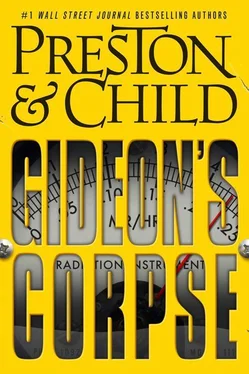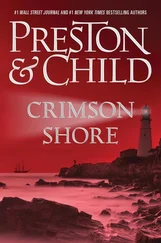The conference room emptied as quickly as it had filled. As Dart picked up the black folder and rapped it smartly against the table, Cunningham, his assistant, approached. “Any orders, sir?”
“I want you to get in touch with that FBI agent, Fordyce. See if he and Crew have made any progress in Santa Fe. This whole investigation is a lumbering monster, but those two are just nimble enough to come up with something fresh. I want to keep an eye on them.”
San Ildefonso Pueblo lay alongside the Rio Grande in a long grove of cottonwood trees. It was situated at the base of the Jemez Mountains, at the point where the road to Los Alamos began the climb into the foothills. Gideon had been to many Indian dances at San Ildefonso, particularly the famous Buffalo Deer Dance—it was a popular pastime among people who worked at the lab. But today the pueblo was almost deserted as they drove through it, past the dirt plaza and old adobe buildings.
As they approached, an overloaded pickup truck lumbered past, coating their car with dust.
Even the Indians are leaving , he thought.
In the plaza, they saw a group of Indian men, wrapped in Mexican blankets, sitting on wooden stools along one side, in the shade of an adobe wall. At least they didn’t look panicked, drinking their morning coffee before a row of wooden drums.
“Wait,” said Fordyce. “I want to talk to them.” He slowed the car and stopped under an old cottonwood tree.
“What for?”
“Ask directions, maybe.”
“But I know where the school is—”
Fordyce threw the car into park and was already getting out. Gideon followed, irritated.
“Hi, there,” Fordyce greeted them.
The men watched them approach with stolid faces. It was evident to Gideon they were involved in some sort of drum practice, perhaps getting ready for a dance, and did not welcome the interruption.
“Any dances today?” Fordyce asked.
A silence, and then one said: “Dances have been canceled.”
“Don’t forget to put that in your notebook,” Gideon muttered.
Fordyce removed his FBI shield. “Stone Fordyce. FBI. Sorry to interrupt you.”
This was met by dead silence. Gideon wondered what the hell Fordyce was up to.
He put away the badge and gave them a disarmingly friendly smile. “Maybe you read about what’s going on in New York City?”
“Who hasn’t?” came the laconic reply.
“We’re investigators on the case.”
This got a reaction. “No shit,” one of the men said. “What’s going on? You got a lead on the terrorists?”
Fordyce held up his hands. “Sorry, guys, I can’t tell you anything. But I was hoping you might help me with a few questions.”
“You bet,” said one man, evidently the leader. He was short and solid, with a square, serious face, a bandanna tied tightly around his head. They had all risen.
“This fellow who died of radiation exposure in New York, Reed Chalker, gave his book collection to San Ildefonso. Did you know that?”
The look of astonishment on their faces indicated they did not.
“I understand he was a fan of the dances.”
“We get a lot of people coming down from Los Alamos to see the dances,” said the leader. “A lot of our people work up there, too.”
“Is that right? Your people work up there?”
“Los Alamos is the pueblo’s biggest employer.”
“Interesting. Anybody know Chalker?”
Shrugs all around. “It’s possible. We could ask around.”
Fordyce produced his cards and handed them out to everyone. “That’s a great idea. Ask around. You learn of anyone here who knew Chalker, even slightly, get in touch. Okay? There must have been a reason why he gave his book collection to the school, and I’d sure like to know that reason. You all could really help the investigation. I mean it. Now we’re heading over to the school—is it this way?”
“Just go straight, take a left, you’ll see it. There may not be anyone around. School’s canceled. A lot of our people are leaving.”
“I understand.” Fordyce shook hands warmly all around and left the men in a group, talking animatedly.
“That was good,” said Gideon, impressed despite himself.
Fordyce grinned. “It’s like fishing.”
“Don’t tell me you’re a fisherman, too.”
“Love it—when I get the chance.”
“Fly?”
“Bait.”
Gideon scoffed. “That’s not fishing. And here for a minute I thought we had something else in common.”
He caught a glimpse of the Rio Grande through the trees, the sunlight glinting off the river as it ran over a bed of stones, and he had a momentary flashback to a trout stream far away and many years ago, fishing with his father during the good time, his father explaining that success in fishing, as in life, depended mostly on how long you kept your fly on the water. “Luck,” he used to say, “is where preparation meets opportunity. The fly is the opportunity, the preparation is the cast. And the fish? That’s the luck.”
He quickly pushed that particular memory aside, as he habitually did whenever thoughts of his father arose. It was disturbing to find even here, at this remote Indian pueblo, that people were leaving. Then again, they were in the very shadow of Los Alamos.
The school lay beside the ancient cottonwood groves along the river, flanked by dusty baseball diamonds and tennis courts. It was a weekday morning but the school, as the men had indicated, was mostly empty. An eerie silence hung over the campus.
They checked in with the office and, after filling out a visitors’ book, were escorted to the small school library, a room looking out over the soccer field.
The school librarian was still there, arranging books, a stout lady with long black braids and thick glasses. She got interested when Fordyce showed his ID and they mentioned Chalker’s book collection. Again, Gideon was surprised at how eager she was to help.
“Oh yes.” She shuddered. “I knew him. I did. And I can’t believe he became a terrorist. I just can’t believe it. Do they really have a bomb?” Her eyes widened.
“I’m not allowed to discuss the details,” said Fordyce kindly. “I’m sorry.”
“And to think he gave us his book collection. I have to tell you, everyone here is very worried. Did you know they let school out early for the summer? That’s why we’re so deserted around here. I’m leaving myself, tomorrow.”
“Do you remember Chalker?” Fordyce interrupted patiently.
“Oh yes. It was about two years ago.” She was almost out of breath at the recollection. “He called and asked if we needed books, and I said we’d love to have them. He brought them in that afternoon. There were two, maybe three hundred. He was actually a nice fellow, very nice! I just can’t believe it…”
“Did he say why he was giving them away?” Fordyce asked.
“I don’t recollect. I’m sorry.”
“But why to the pueblo? Why not to the Los Alamos public library or some other place? Did he have a friend here?”
“He really didn’t say.”
“Where are the books now?”
She gestured. “They’re all mixed up. We shelved them with the others.”
Gideon looked about. There were several thousand books in the library. This was going to be more of a chore than he’d anticipated.
“Do you remember any titles in particular?” Fordyce asked, jotting notes.
She shrugged. “They were all hardbacks, mostly mystery novels and thrillers. Quite a few signed first editions—he’d been a collector, apparently. But that didn’t matter to us—to us, a book is meant to be read. We just shelved them where they belonged.”
While Fordyce talked, Gideon drifted away and began to peruse the fiction section, pulling down books at random and flipping through them. He didn’t want to admit it to Fordyce, but he feared his idea might turn out to be a waste of time. Unless by sheer chance he came across one of Chalker’s books with a significant piece of paper stuck into it, or some telling note in the margins. But that seemed unlikely—and book collectors did not normally annotate their books, especially autographed editions.
Читать дальше












